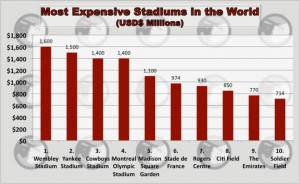
 Known as the “Olympic Legacy,” the decade after a city hosts the games is often quite prosperous. With an enhanced infrastructure system in place, the city is often a tourist and corporate business haven.
Known as the “Olympic Legacy,” the decade after a city hosts the games is often quite prosperous. With an enhanced infrastructure system in place, the city is often a tourist and corporate business haven.
The city reap the benefits of enhanced public transportation and will often secure future sporting events due to the excitement of hosting an event at a former Olympic site, but the cost of maintaining those buildings can come at a price.
Cities like Seoul have used their Olympic Stadium since 1984 and still use it today, but it was not used when Korea and Japan co-hosted the 2002 World Cup. Cities like Montreal put themselves into so much debt from the 1976 Olympic Games, that they just finished paying if off in the past decade. These stadiums and venues often created a burden on a city to manage it when they are unable to use that land to built more functional and needed infrastructure.
Often, countries like Korea and China use the Olympics to showcase their entire nation and not just one specific city.
Maybe there is a way to begin to think how these megastructures can be reconfigured to serve other purposes for a city.